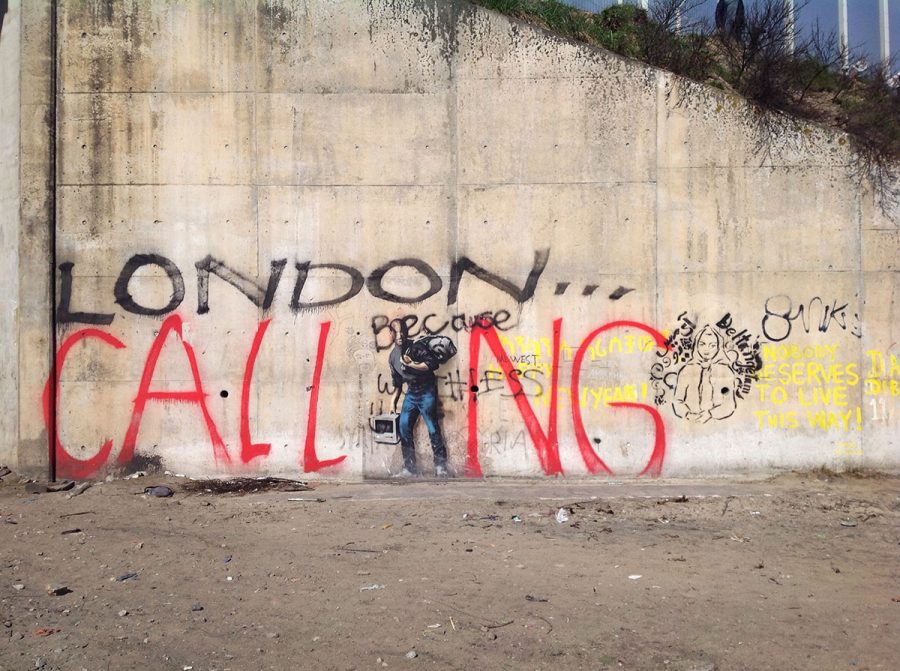For better or for worse, the Jungle is being dismantled
Refugees in Calais, France are forced to find another temporary home
More stories from Lara Bockenstedt
Photo by Lara Bockenstedt
A Banksy underneath the bridge located by the Jungle. The image depicts Steve Jobs, a son of a Syrian immigrant, on the run.
Half a year ago, I walked the pebbled, misshapen paths of the Jungle in Calais, France giving brief English lessons. There, men expressed wishes and reflected upon their lives prior to the chaos.
Located in Calais, a port city on the northern tip of France, the Jungle is a refugee camp. While most of the refugees are Afghani or Sudanese, Syrians also lived in the camp. The relationship between camp members and French police, government and locals has been anything but simple.
Yesterday and today the process of dismantling the camp has begun. My time there was short and my experiences narrow, but I cannot help but think of the many faces of the Jungle.
During the few April days I was there, men shared histories of losing their entire families in one bombing attack, their best friend to murder and of dangerous journeys across the sea from Turkey to Greece.
Some of the refugees in Calais may be there for economic reasons, but more often than not, the explanation was “I want to go to England because it’s safe there. Not safe my home.”
Too frequently, they left because their lives were threatened or because they would have been forced into the army. They wanted to go to England because they had family there, could speak English or foresaw a brighter future.
While many stand out in my memory, meeting 16-year-old Yusef cemented an already growing anger towards the conditions of the camp. His was a journey of walking five months from Syria to France. When the boat overturned carrying him and his family from Turkey to Greece, he had to swim for his life.
He arrived at the camp alone.
One afternoon the two of us looked over basic English vocabulary, covering elements such as weather and time.
When the French police started shooting rubber bullets and sending off tear gas, our lesson abruptly stopped. Yusef had been laughing and eagerly soaking in the new words when curls of yellow gas began to enter the tent.
The fragmented volunteer groups started rounding up to leave the camp. Yusef sat with a frozen posture, staring at his pen. This small portion of informal education was finished for the day.
I walked outside where one man had a bleeding arm, victim of a gun being beat against him. My hand sanitizer and bottled water cleaned the wound. Carefully, another man wrapped toilet paper around it for dressing.
First Aid existed in this way because the French government did not recognize the camp and drastically miscounted the number of refugees. Well over 3,000 lived in the camp when I went, but the government blindly only saw 800. They provided 24 port-a-potties and scant resources.
Earlier this week, there were between 6,000 and 8,000 refugees.
That day, I saw clouds of tear gas and scared men, some who fought against (and provoked) police with stones. But mostly people who were tired of this homeless monotony.
Europe struggles to support this number of refugees. It became unsafe for the truck drivers to use the highway passing the Jungle because of the amount of people who tried to catch a ride underneath the trucks.
After returning home, I kept up with volunteers who suspected that kids who had been in the camp were being kidnapped for their organs to be sold on the black market. They also saw winter approaching and that resources such as clothing and blankets were scarce.
Yet, these people cannot stay home. This is a microcosm within a larger multifaceted refugee crisis.
The Jungle I saw was filled with reflections of the inhabitants’ cultures such as restaurants, libraries, a mosque, a church and small grocery stores, all created from tarp and boards. All of which will be gone within the next few days.
According to Sara Allen, a continuous volunteer at the Jungle from England, the camp had become “untenable for everyone, for the locals, for the police, kind of migrants themselves and for the children,” she said. “It was a breaking point.”
Allen said greater issues within the refugee crisis were unlikely to change.
“From an American audience, I guess Calais is emblematic of the broader European refugee crisis,” she said.
She said many of the children in the camp have been able to make the cross to England and other adults have been taken to asylums. Still, she said, there’s a fear for the number of people leaving and that another version of Calais will appear elsewhere.
It can be difficult to understand what to do. What I encourage is each person exercises their democratic rights: Read up about the candidates and get out to vote. Donate, host fundraisers and carefully consider the idea of allowing more Syrian refugees into the United States.
The article “16 ways you can help Syrian refugees now” from GlobalCitizen.org highlights effective steps to help alleviate the crisis.
Refugees are not skittles in a bowl as one presidential candidate would see them. Anything is better than nothing and these people without a home deserve better.


